 A student of history will see that whenever things got out of hand in society, politics, or the Church, a saint (or saints) would arise either from the grassroots or from royal birth and somehow work toward the good through his or her leadership. From the beginning of salvation history God has empowered men and women as leaders to guide His people. The Old Testament is replete with holy, faith-filled figures, and the New Testament tells of many courageous disciples of Jesus Christ who became the leaders of His Church: the apostles, the Virgin Mary, Mary Magdalene, Priscilla and Aquila and a myriad of others. After a few centuries the Church, like everything else involving people, became complicated, touched by the complexities of growth mixed in with the particular politics of the day. God knows His people and therefore He continuously inspires men and women to rise to the occasion so that we might not perish, but rather thrive as the people He intends us to be. If we discount this fact, we will miss the opportunity to do our part to work for the good rather than become overwhelmed by that which is evil, and we will also miss the invitation to hope, which is in fact, the Christian way. In other words, we should never despair, but we should also consider that perhaps we are the ones called to be leaders. 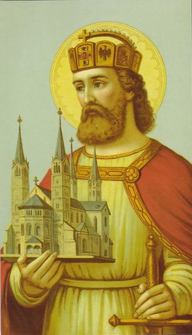 Among the wicked, power-hungry, or ego-driven who are mixed within the line of kings and queens in history, are also the good and the holy ones, and of these some were saints. Two such saints have feast days during the latter part of August so it inspires hope to remember that there have been, (and still are), many good men and women who worked diligently to make heard the voices of the poor and downtrodden and at improving the pressing issues of their times. Let us look to them as examples of good leadership from among the many who have lived. The first of these is St. Stephen of Hungary, (969-1038) whose feast is celebrated on August 16. He is credited with unifying the people of Hungary, and as their first king he reigned for 37 years. Stephen was born a pagan, but was baptized at the age of ten when his father accepted Christianity. As king, St. Stephen had all the political problems one would expect, but he worked tirelessly against paganism, trying to “Christianize” his country. He had a deep devotion to the Virgin Mary, and consecrated Hungary to her during his reign. He also set up a system of tithes to support churches and to relieve the suffering of the poor. Despite all the responsibilities and duties of being king, he made himself easily accessible to everyone and is most remembered for his generosity and care for the poor, setting an example to his people on how to live a Christian life. 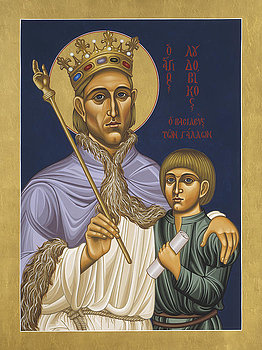 On August 25 we celebrate another royal, St. Louis IX, King of France, (1214-70). He was pious from an early age; after he became king, he protected French clergy from secular leaders who pushed against them, often violently. In 1242, France entered into war with Henry III of England, but after the war ended Louis made restitution to the innocent people whose property had been destroyed as a result of the fighting. Like St. Stephen, Louis was most well-known for his generosity and his work to alleviate poverty. Apparently, he had many poor people eat in his house daily and often he served them himself! Among his other efforts, he built hospitals and homes, and even built a hostel for women who were driven to prostitution (due to poverty) which he called the “House of the Daughters of God.” He treated everyone with dignity, and therefore he did not judge these women to be sinners, but rather, victims of poverty. Louis also established the Sorbonne, built convents and monasteries, and the beautiful cathedral, Sainte Chapelle, in Paris. He and his wife had 11 children and he was known to be a devoted father. Unfortunately St. Louis died during a Crusade to the Holy Land, but before his death he instructed his son Philip as to how he should behave as the next king, ensuring that his son reigned with the same Christian values that he had held so dearly. 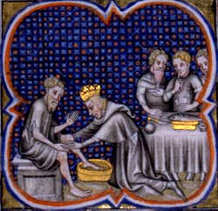 Two kings, two vastly different countries with different issues, two hundred or so years between them in history, yet we see how God inspires good leaders for His people. Of course, Stephen of Hungary and Louis IX of France were not forced to do good things. Both could have used their power and wealth for selfish intentions or to simply feed their royal egos, but instead both men chose to use the gifts they were given through birth for the greater good of the Kingdom of God. Each one took seriously the gospel discourse taught by Jesus that culminates with His statement: “Whatever you did for one of these least brothers [and sisters] of mine, you did for me.” (Matthew 25:40) Life is mysterious, and some people do seem to have obvious material wealth or interior gifts. God does not force anyone to use the gifts He gives in a particular way, but as Jesus said, “To the one to whom much is given, much is expected.” (Slight paraphrase of Luke 12:48) There are many people in the world, in our country, in our neighborhoods, and especially in our church families who have position, material means, and/or inner giftedness that they can use for the good of the community as compassionate and holy leaders. But while some are called to a higher responsibility, the Catechism tells us that all Christians are called at Baptism to be priest, prophet, and king. We are all meant to give witness as prophets by living the values which we have been taught: kindness, generosity, compassion, mercy, forgiveness, love, peace, justice and so forth. We can certainly lead by our actions, no matter how small they might seem. 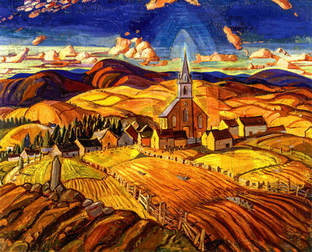 We are all called to be priests, (the common priesthood), insofar as we are meant to be prayerful and to live sacramentally. That means the Eucharist is our food and that everything we do flows from our intimacy with Jesus; it means that we live our baptismal call to holiness utilizing the gifts of faith, hope and love; that we “exercise” our Confirmation gifts to live according to the gospel; that we go to Reconciliation to receive the mercy of God so that we might also share it with others; that we live holy marriages, raising up our spouses and being raised up by them, and that those who are parents are to be good witnesses and teachers of the faith to their children. It means as parents, teachers, and friends we intentionally invite young people to seek out religious vocations and encourage them in pursuit of their call. Priests, Deacons, Brothers, and Sisters often say that they discovered a vocation when they were invited by someone who ‘saw something’ in them. And quite often, even if not personally invited to consider such a life, those who have entered into religious vocations have said someone’s actions inspired them. Educating children in the faith is a good start to all holy vocations whether to marriage, single, or religious life. Thus by teaching the faith, we are raising future leaders. 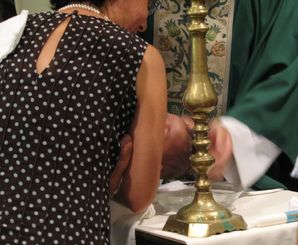 Finally, we are all called to be kingly: we are a royal priesthood. (1Peter 2:9) We are anointed with oil at Baptism, Confirmation, (and at Holy Orders for those who become clergy), specifically because this signifies that we are chosen by God. Let us not forget David the young shepherd boy in the Old Testament who was picked from among his brothers to be anointed as future king of Israel. The prophet Samuel poured oil over David’s head as a sign that he was chosen, from that point forward marked to lead for the good of God’s people. King David was God’s chosen instrument and from his lineage came Jesus the Messiah and Lord. Therefore, we need to rise to the call of our anointing at baptism to be priest, prophet, and king, to lift up the poor, to work toward housing the homeless, toward filling convents and rectories, toward justice and peace, and toward healing that which divides us. We may not have the riches of St. Stephen or St. Louis IX, but we do have the richness of love and mercy which fills our hearts. We were not consecrated as kings or queens in the political sense, but we are consecrated by the sacred oils of the sacraments and by the love of Jesus poured out for us on the Cross, and in His Body and Blood given for us to fuel our courage and inflame our hearts. In short, all Christians are called to lead by example. Rather than despairing over the times in which we live, let us rise to our anointing, accepting the invitation to hope.  May we be aware of the richness with which we have been filled that we might, with gratitude, share it with others! May we pray for the intercession of St. Stephen of Hungary and St. Louis IX of France that following their example we might continue the work of love and mercy to which every Christian has been called! May we rely on the graces given to us in the sacraments, utilizing that which we have been given! And may we act in love, even in the smallest things we do, sharing the mercy and love of Jesus with everyone who we meet! Let us continue to meet in the heart of Jesus! Peace! ©Michele L. Catanese This was written a week before it was posted. I say this because those of us on the Gulf Coast of Texas and those in the greater Houston area are in the midst of a disaster of biblical proportions. Please pray for us, as it is far from over, and please be generous with help if you can. But as I have indicated many times in this blog, there is great power in prayer. Please pray for us both for the duration of this crisis and long afterward as the cleanup will take years. Thank you. Next entry will be on September 11. If you want more on St. Stephen of Hungary, click here: http://www.catholicnewsagency.com/saint.php?n=565 For more on St. Louis IX, click here: http://archstl.org/becomingcatholic/page/saint-louis-king-france Images: 1. This is a photo I took while in Fort Davis, Texas. These birds were not actually caged, but were in a sanctuary which provided food and places for them to nest. I chose to use this particular photo because it seemed to be an invitation to hope: the bird is able to be free even though he appears to be caged. So, too, are we free to respond to the gifts God provides, and to never cease to hope. 2. This is a painting of St. Stephen of Hungary that often appears on 'holy cards,' traditionally used to provide prayers on the back that would ask the intercession of the saint depicted on the front. I chose this image because he is holding a church, or rather, it shows him as in his role of upholding the Church. 3. This is the icon, Saint Louis IX With His Son Philip III by Fr. William Hart McNichols. I chose this because it shows Louis' attitude of wanting to be a blessing to his people: if you look at the top of the scepter there is a hand in the posture of blessing. I also like that he is portrayed in his fatherly role here, passing on his desire that Philip behave in the same way, the way of the gospel, when he became king. You can find this icon at https://fineartamerica.com/featured/st-louis-ix-with-his-son-philip-iil-046-william-hart-mcnichols.html. 4. This is a tiny stained glass rendition of St. King Louis washing the feet of the poor. I chose this because he was known to serve the poor with his own hands, so the symbolism here is that the master washed the feet of the servant, just as Jesus washed the feet of His apostles at the Last Supper. King St. Louis certainly lived this gospel passage. 5. Here is a painting by Arthur Lismer, one of the famous Canadian artists in the "Group of Seven." It is called Quebec Village, painted around 1925. I chose it because of the vibrant colors, but also because it depicts the sacramental life. That is, the church is the center of the village and so the sacraments should be the point from which our lives flow, giving us the vibrancy that a life in Christ offers. 6. I took this photo at the baptism of the daughter of one of my friends. I chose this because it captured the priest at the point in the baptism in which he was anointing the baby. 7. This last image is also one of my photos. It was taken atop the Sandia Mountains outside Albuquerque, New Mexico. I chose it here because it called to mind the richness of life, a scene which implies the invitation to live in the spirit of hope rather than to give in to all the noise and circumstances which conspire to ruin our trust in God.  “Seek and you will find.” Even if not overly familiar with naming chapter and verse, many know this statement is from the Sermon on the Mount, one of the most well-known sections in the New Testament. (Matthew chapters 5-7; the exact verse quoted is Matt 7:7.) This Sermon is the centerpiece of Jesus’ teaching because in it He outlines the way we are to live if we want to be His followers. Basically Jesus tells us that the Mosaic Law was always meant to be an instrument of love and so consequently we should see the gospel as governed, so to speak, by the law of love; He also tells us that because love is the way of our lives, we should treat others as we want to be treated and that we should not judge others by any kind of yardstick since things are not always what they seem to be. The way of this seeking and finding, the way to know how to apply the law of love, is to seek wisdom so that we can see in a new way, perhaps a bit more as God sees. To see this way and to have the wisdom which Jesus teaches is to learn how to discern that which leads us closer to God and therefore to choose it, rather than that which leads us away from God, and therefore needs to be avoided. It is not always easy, but we do have guides who show us how to seek and find: the Saints teach us that we need to pray for the gifts of wisdom and discernment, and that we can in fact, attain them. To be wise, is surely to be holy. 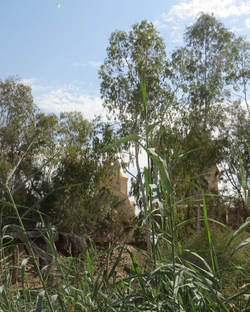 Jesus began the Sermon on the Mount with the Beatitudes (Matthew 5:3-10) and each one begins with the same phrase: “Blessed are the poor in spirit…blessed are they who mourn…blessed are the meek….” The word ‘blessed’ was considered synonymous with being holy, happy, or wise. This meaning came from the tradition of Jewish wisdom literature prevalent in the centuries just prior to the time of Jesus. Jesus would have been very familiar with this tradition; therefore He intentionally taught this wisdom as a pathway of love which leads one close to God. Just as in the Wisdom Books of the Old Testament, Jesus indicated that the wise one is the holy one. (Re-read the Beatitudes substituting the word wise for blessed.) Spiritual wisdom, therefore, is what the follower of Jesus seeks to obtain; that is, the disciple of Jesus seeks holiness. In the (Old Testament) Book of Wisdom the writer makes it clear that wisdom is not something one learns in a classroom or by obtaining knowledge, but that it comes from seeking after the ways of God through prayer. The author realizes that to have wisdom we must behave the way God does, with mercy and love. Indeed the most beautiful part of the Book of Wisdom comes when the author shows how God’s mercy is connected with wisdom when he writes, “But you have mercy on all, because you can do all things; and you overlook sins for the sake of repentance. For you love all things that are and loathe nothing that you have made.” (Wisdom 11:23-24; but do read all of it from 11:23-12:1.) That Jesus continued to emphasize this message of mercy and love is evidence that this is important to our growth in holiness. The wise one is the holy one, and the holy one is the one who shows mercy and love. 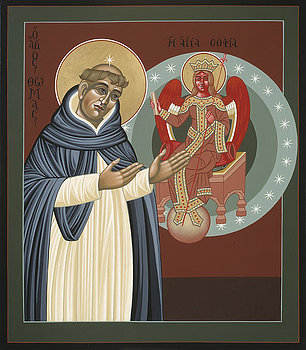 In the history of the Church there have been many brilliant Saints who were theologians and philosophers, now known as Doctors of the Church, such as Augustine, Thomas Aquinas, and Bonaventure. These men certainly had knowledge and wisdom. In other words, they were outstanding academics with brilliant intellects, but they were also holy, living with discernment the love and mercy which comes from a life steeped in the gospels. Another outstanding Doctor of the Church was St. Hildegard of Bingen (1098-1179) who was not only incredibly knowledgeable, but had the true wisdom which comes with holiness. Hildegard was a mystic, but she also understood ecology, medicine and the ways the human body works, what we would call engineering, (creating a system of indoor plumbing), music, (writing the world’s first opera), and theology. Most of what she knew came through her mystical experiences and gifts from the Holy Spirit, but she was also known for being a woman of mercy and compassion. She possessed spiritual wisdom, the insights of which led her to intellectual understanding, but which also enabled her to grow in discernment, charity, and love. I suspect that if one were able to ask her what was more important to her, the intellect or the wisdom which comes from God, she would not hesitate to say that intellect pales in comparison to that which comes from God. 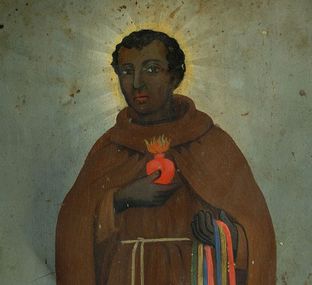 Another wise saint (someone many are unfamiliar with, but should know) was known as St. Benedict the Moor (1526-89). To be clear, ‘the Moor’ is actually a misnomer: he was not a Moor since the Moors were descendants of Arabs and Spaniards and he was descended from neither of these. In truth, Benedict was nicknamed ‘il Moro’ which in Italian means ‘the Black.’ Benedict and his parents came from Africa, taken to Sicily as slaves, and therefore he was a man of color. Somehow over the years ‘il Moro’ was mistranslated ‘the Moor’ when in reality he is St. Benedict the Black. It is an important distinction; to truly understand the circumstances of his life and how remarkable he truly was, it is essential to know his true origins. Born into slavery, Benedict was given his freedom when he was 18, becoming a day laborer due to his lack of education. He was ridiculed for being generous to the poor, but he remained unperturbed by this, ministering to the sick and sharing what little he had. At 21 he entered the Franciscans in Palermo, spending the first part of his ministry as a lay worker in the kitchen. But after the head of the friary died, this simple man who could neither read nor write was chosen to be the new leader. He was said to have possessed divinely-given knowledge of the Scriptures and of deep theological truths, “which astounded learned men and aided him in the direction of souls.” * St. Benedict was generous to the poor throughout his entire life and miracles were reported through his intercession. It was said that at times his faced glowed radiantly, especially when he was at prayer. Toward the end of his life he willingly returned to his humble position in the kitchen, dying at the hour he said he would, having lived a life of service, mercy, compassion, and spiritual wisdom. This is a man who truly lived the gospel, even though he could not read a word.  St. Benedict the Black teaches us that wisdom is not something that is elusive and it is not something which is only for ‘elite minds.’ However, he also shows us that the wisdom of God is not at all the same as the wisdom of the world. The world will mock and ridicule, even attack us, for trying to live the wisdom of God through a life of holiness. But the wisdom of God is that which ultimately brings healing and wholeness, and it is the message of the Gospel. It is not the easier path, and in fact, it can be quite challenging to stay the course. But it is not a path we travel without assistance. Jesus assured us of this when He said: “Seek first the kingdom of God and his righteousness, and all these things will be given you besides.” (Matthew 6:33) In other words, if we want to grow in holiness we are to seek that which is of God, and in seeking it, we will find it. If we want to be holy we need to pray, acquainting ourselves intimately with Jesus. His way of love must become ours; His way of seeing the world, His way of forgiveness, compassion, mercy, generosity, kindness, justice, and peace must find a home in our heart if we are to become wise. Anything which leads us to God and not to self, anything which leads us to love, embraced as our way of life, will render us wise. The wise one seeks and will find, but that one will not stop there. The wise one, in finding, will share. That is the way of love and that is the way of Jesus. True wisdom is to seek in prayer, to find in one’s heart the Word who takes up residence there, and to share the wealth of love, mercy, and compassion with a world desperately in need. Let us be like St. Benedict the Black, humbly bringing the wisdom of Jesus in word and deed to those who do not know Him, bringing comfort to the suffering, and joy to the lonely. 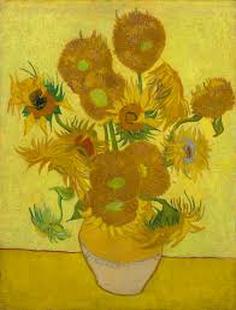 May we seek the path of love that we might find true wisdom! May we ask for the intercession of St. Benedict the Black to help us seek only that which brings healing, light, truth, and life and to reject all that moves us away from these things! May we have the courage to live the life of wisdom as taught by Jesus, relying on God’s mercy and grace to persevere! May we share what we have with others, both from our goods and from the wisdom we possess in the Gospels! And may we in seeking, find, and in finding, share the great love, mercy, and compassion of Jesus! Let us meet in the Heart of our Lord Jesus! Peace! ©Michele L. Catanese * The quote is from an excellent article on St. Benedict the Black found at http://www.roman-catholic-saints.com/st-benedict-the-moor.html. Another good resource is found at http://catholicsaints.info/saint-benedict-the-black/. Note: The next post will be on August 28. Images: 1. This is a photo I took in Maine at the Cape Elizabeth Lighthouse. I chose this for the beginning of the post because lighthouses are often symbolic of seeking and finding since they are meant to safely guide mariners to the ports that they seek. 2. This is a photo of a church almost hidden in the reeds from a vantage point at the Jordan River in Israel. I took this picture with the intention of the church being seen obscurely and therefore I chose it here for the same reason: it takes a bit of effort to seek and find. Quite often what we seek appears gradually, but it is worth the effort. 3. This icon is called The Silence of St. Thomas Aquinas by Fr. William Hart McNichols. I chose to use it here because it completely captures the point I was making about some of the brilliant theologian saints. St. Thomas was more than a brilliant thinker; he was a mystic and a holy man. In this icon he is seen contemplating holy wisdom which he finds in the profound silence of prayer. He could not have lived the holy life he did, nor could he have written a word, without obtaining spiritual wisdom. This icon can be found at https://fineartamerica.com/featured/the-silence-of-st-thomas-aquinas-097-william-hart-mcnichols.html. 4. This painting of St. Benedict the Black is from Mexico. I chose it because it shows the Saint in great simplicity, dressed in his Franciscan robes, his face aglow with the love of God. I love that his heart is in his hand, as if he is about to offer it to the viewer. It reminds me of the Sacred Heart of Jesus and perhaps the artist meant for us to realize the Benedict's heart had become one with the heart of Christ. It is an absolutely stunning painting which captures the true essence of this great Saint as well as the connection between wisdom and love. 5. This is another of my photos, taken in Fort Davis National Park in Fort Davis, TX. I chose it here because it shows a vista which would be a difficult path for one to try to cross. 6. This final image is one of seven paintings of the same subject done by Vincent van Gogh, one of his Sunflowers series. I chose this particular one because of his predominant usage of shades of yellow. It seems to capture light and life, especially if you look closely and notice the texture that he used in some of the flowers. By adding texture he has made these sunflowers burst with life. |
Heart Speaks to Heart
|

 RSS Feed
RSS Feed

